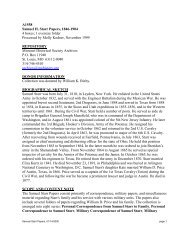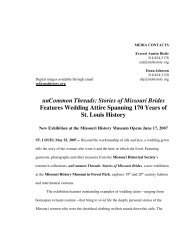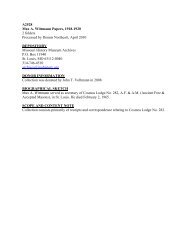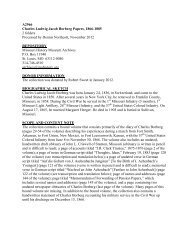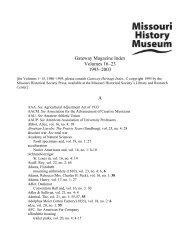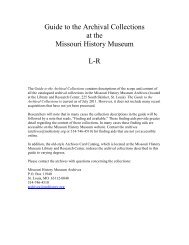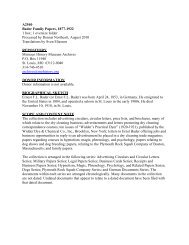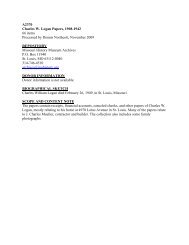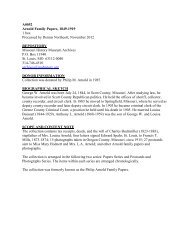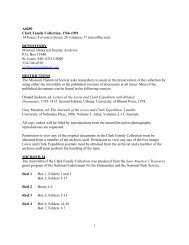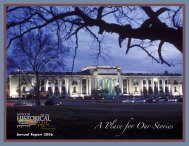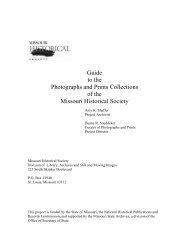- Page 1 and 2:
Guide to the Archival Collections a
- Page 3 and 4:
A0005 Accounts Collection, 1766-194
- Page 5 and 6:
Undated autograph signature of Jane
- Page 7 and 8:
A1614 AIDS Foundation of Saint Loui
- Page 9 and 10:
Cite as: William A. Albrecht and Fa
- Page 11 and 12:
Chapel; and account of the Grand Re
- Page 13 and 14:
The collection consists of correspo
- Page 15 and 16:
Collection, 1922-1923, no date. 1 f
- Page 17 and 18:
married Idress Head in 1913. Head h
- Page 19 and 20:
Finding aid available. Cite as: Rec
- Page 21 and 22:
Cite as: Marie Benson Ames Papers,
- Page 23 and 24:
Anderson, Russella Easton. Genealog
- Page 25 and 26:
Cite as: Otto Anschuetz Papers, Mis
- Page 27 and 28:
A1906 Archer, Sharon. Papers, 1959-
- Page 29 and 30:
Armistead family and a typed copy o
- Page 31 and 32:
Cite as: Philip Arnold Family Paper
- Page 33 and 34:
Cite as: John Ashcroft Collection,
- Page 35 and 36:
Collection, 1852-1853. 1 folder [fo
- Page 37 and 38:
Collection, 1850-1937. 1 folder [fo
- Page 39 and 40: Advertisement for grand opening, [1
- Page 41 and 42: to the United States in 1884, and o
- Page 43 and 44: A1938 Bakeless, John (1920-1978). P
- Page 45 and 46: Baldwin, Clara Estella. Papers, 195
- Page 47 and 48: Cite as: Balz Family Baptismal Cert
- Page 49 and 50: Barclay, Shepard (1847-1925). Paper
- Page 51 and 52: Finding aid available. Cite as: Rob
- Page 53 and 54: J. Neilson Barry was educated at th
- Page 55 and 56: Barton, David (1783-1837). Papers,
- Page 57 and 58: Contains brief autobiographical ske
- Page 59 and 60: A1985 Baugh Family. Genealogy, 1932
- Page 61 and 62: Papers, 1856-1860. 1 box George D.
- Page 63 and 64: Papers, 1802-1964. 1 box; 1 oversiz
- Page 65 and 66: Collection, no date. 1 folder Willi
- Page 67 and 68: A2011 Beilharz-Fuller Family. Genea
- Page 69 and 70: A2018 Bell, Ovid Hall. Biographical
- Page 71 and 72: Bender, Averam Burton. Biographical
- Page 73 and 74: T.B. Constain, Andrew W. Mellon, Ad
- Page 75 and 76: Contains one letter (in German) to
- Page 77 and 78: A2030 Bernhardt, Sarah (1844-1923).
- Page 79 and 80: Gratiot). The collection also inclu
- Page 81 and 82: The collection contains one letter
- Page 83 and 84: gestures and signs by the local pop
- Page 85 and 86: Finding aid available. Cite as: Dan
- Page 87 and 88: president of the Missouri Pacific.
- Page 89: art collector with a special intere
- Page 93 and 94: A2081 Blattner, Jacob. Collection,
- Page 95 and 96: A2085 Block, David. Collection, no
- Page 97 and 98: A0139 Blow, Henry Taylor (1817-1875
- Page 99 and 100: The collection consists of two copi
- Page 101 and 102: Boggs, Lilburn W. (1798-1860). Pape
- Page 103 and 104: A2109 Bolinger, J. Letter, 1871 Feb
- Page 105 and 106: includes legal papers, mostly from
- Page 107 and 108: Collection, 1654-1931. 1 folder (24
- Page 109 and 110: articles of association or agreemen
- Page 111 and 112: A2136 Boyd, Elisha. Letter, 1829. 1
- Page 113 and 114: Cite as: August Braisart Death Cert
- Page 115 and 116: Collection contains typescript copi
- Page 117 and 118: Breckinridge, V, 650 Oakland, Webst
- Page 119 and 120: Mo., 1865.” Includes photograph o
- Page 121 and 122: Committee for Devastated France, da
- Page 123 and 124: Biographical data sheet for the Mis
- Page 125 and 126: and Kirkwood school districts. As a
- Page 127 and 128: Brown, Jane Desloge. Scrapbook, no
- Page 129 and 130: A0188 Brown-Reynolds duel collectio
- Page 131 and 132: Genealogy, no date. 1 folder Family
- Page 133 and 134: egarding incidents in Newbern in re
- Page 135 and 136: Collection contains typescript exce
- Page 137 and 138: A2268 Buford, Anthony A. (1901- ).
- Page 139 and 140: checks, accounts, and receipts issu
- Page 141 and 142:
A0209 Burlingame Family. Papers, 18
- Page 143 and 144:
David Ives Bushnell was born April
- Page 145 and 146:
Commission among the Missouri troop
- Page 147 and 148:
A2482 C.G. Caines’ Grocery Store
- Page 149 and 150:
Family history sheet and biographic
- Page 151 and 152:
A2735 Capen, Henry. Papers, 1870-18
- Page 153 and 154:
18, 1949; translation by M. Heinric
- Page 155 and 156:
Louis and Tennessee Iron Mountain C
- Page 157 and 158:
Papers, 1881-1911. 9 boxes John H.
- Page 159 and 160:
conditions en route to and in Calif
- Page 161 and 162:
Baudelaire (French), 1925; undated
- Page 163 and 164:
A0255 Central High School (St. Loui
- Page 165 and 166:
Correspondence and reports regardin
- Page 167 and 168:
Frederick W. Chatard was the U.S. N
- Page 169 and 170:
A0272 Chinn, R.B. Collection, 1820-
- Page 171 and 172:
document appointing Chouteau as age
- Page 173 and 174:
Cite as: Percival Chubb Marriage An
- Page 175 and 176:
week. To meet the demand and give a
- Page 177 and 178:
Civilian defense collection, 1941-1
- Page 179 and 180:
the Revolutionary War and later exp
- Page 181 and 182:
dated September 21, 1941, which con
- Page 183 and 184:
Indexed in the archives card catalo
- Page 185 and 186:
Family History Sheet, 1953 Jan 16.
- Page 187 and 188:
Journal of the Constitutional Conve
- Page 189 and 190:
Biographical data sheet for the Mis
- Page 191 and 192:
Records, 1830-1890. 3 volumes The C
- Page 193 and 194:
Contracts collection, 1811-1852. 1
- Page 195 and 196:
Cite as: Robert and Mary Elizabeth
- Page 197 and 198:
Corwin, Charlton Jason (1824- ). Fa
- Page 199 and 200:
Papers, 1825-1950. 7 folders; 1 ove
- Page 201 and 202:
Crandall, Warren D. ( -1919). Resea
- Page 203 and 204:
to Mr. B.F. Craw, Sullivan, Mo., st
- Page 205 and 206:
pleasure resort; and the most suita
- Page 207 and 208:
Curran, Pearl Pollard (1883-1937).
- Page 209 and 210:
A0355 D.D. Ryrie and Co. (Alton, Il
- Page 211 and 212:
Archives, St. Louis. A0362 Daughter
- Page 213 and 214:
The collection consists primarily o
- Page 215 and 216:
Archives, St. Louis. A0369 DeBourmo
- Page 217 and 218:
Collection, 1544-2001. 12 boxes The
- Page 219 and 220:
Perforated Gummed Labels, no date.
- Page 221 and 222:
Scrapbook, 1944-1946. 1 volume; 1 o
- Page 223 and 224:
Dickson, Joseph (1846-1906). Papers
- Page 225 and 226:
Papers, 1867-1876. 2 folders (appro
- Page 227 and 228:
Donelan, 2 Brookside, Ladue, St. Lo
- Page 229 and 230:
A0398 Dougherty, John (1791-1860).
- Page 231 and 232:
eturns, descriptive rolls and accou
- Page 233 and 234:
Bent; and activities at Santa Cruz
- Page 235 and 236:
and established the Sisters of Char
- Page 237 and 238:
two other primary initiatives: the
- Page 239 and 240:
Cite as: Marius Duvall Papers, Miss
- Page 241 and 242:
A0426 E.C. Co. (St. Louis, Missouri
- Page 243 and 244:
Charles, Missouri; and documentatio
- Page 245 and 246:
Company and Eden Publishing House,
- Page 247 and 248:
A2232 Edwards, Julius J., Jr. (1916
- Page 249 and 250:
Eisendrath, 4930 Pershing Ave., St.
- Page 251 and 252:
ills; transactions concerning the o
- Page 253 and 254:
Westens and a German academy of sci
- Page 255 and 256:
Biographical Data Sheet, 1963 May 2
- Page 257 and 258:
Evans, Jas. S. Letter to H.I. Murph
- Page 259 and 260:
A0465 F.B. Chamberlain Company (Sai
- Page 261 and 262:
Papers, 1848-1867. 1 folder (approx
- Page 263 and 264:
clippings, and other papers of the
- Page 265 and 266:
Diary, 1847-1864. 1 volume Philip G
- Page 267 and 268:
Family History Sheet, circa 1960s.
- Page 269 and 270:
Abstracts were given to donor by th
- Page 271 and 272:
Daniel Robert Fitzpatrick was an ed
- Page 273 and 274:
Flanigan, Ann Russell Allen, Mrs. (
- Page 275 and 276:
Lithographing company located in St
- Page 277 and 278:
main part of the collection concern
- Page 279 and 280:
Cite as: Charles W. Francis Family
- Page 281 and 282:
Freien Gemeinden und Freidenker-Ver
- Page 283 and 284:
A2724 Fremon, Richard Cromwell (191
- Page 285 and 286:
Biographical data sheets and family
- Page 287 and 288:
Barracks in 1846-1847. He went to M
- Page 289 and 290:
A2733 Fulton, Truman R. (1912- ). F
- Page 291 and 292:
A0543 Gaebler, Adolph Nelson (1863-
- Page 293 and 294:
Collection, 1951-1990 (bulk 1966-19
- Page 295 and 296:
Cite as: Anthony (Tony) Ganss Paper
- Page 297 and 298:
A0557 Gasoline ordinances scrapbook
- Page 299 and 300:
(3) Letter signed Dutcher & Co., St
- Page 301 and 302:
A2510 Geo. Kinsey & Co. (Cincinnati
- Page 303 and 304:
A0573 Germania Colonization Company
- Page 305 and 306:
occupation of New Mexico, July-Augu
- Page 307 and 308:
A0580 Gilmer, Francis W. (1790-1826
- Page 309 and 310:
States Volunteers. At this time he
- Page 311 and 312:
succeeding him in office. He taught
- Page 313 and 314:
Collection contains papers relating
- Page 315 and 316:
Program for “The Woman in the Sho
- Page 317 and 318:
A2420 Grand View Consolidated Minin
- Page 319 and 320:
Gratz Family. Papers, 1750-1850. 27
- Page 321 and 322:
and arrival in St. Louis, 1857; not
- Page 323 and 324:
Greenfield, Milton, Jr. (1910- ). B
- Page 325 and 326:
Griesedieck, Edward Joseph, Sr. (18
- Page 327 and 328:
A2778 Grossman, Edwin, Mr. and Mrs.
- Page 329 and 330:
Account books, 1825-1829. 2 volumes
- Page 331 and 332:
A0634 H. Konert and Son (St. Louis,
- Page 333 and 334:
Hagnauer, 816 South Hanley Road, Cl
- Page 335 and 336:
Family history sheet for the Missou
- Page 337 and 338:
y the city of Clayton. Papers inclu
- Page 339 and 340:
Collection contains cases, judgment
- Page 341 and 342:
Harris, Whitney R. Newspaper Clippi
- Page 343 and 344:
of Cooking, and their division of t
- Page 345 and 346:
1893, 1894; and a Famous Barr Co. S
- Page 347 and 348:
scrapbook of newsclippings regardin
- Page 349 and 350:
maid of honor for Nelly Grant. Coll
- Page 351 and 352:
A2381 Hellman, Louis M. Papers, 189
- Page 353 and 354:
The collection consists of family c
- Page 355 and 356:
Cite as: Frederick W. Henze Account
- Page 357 and 358:
German. Cite as: Herwegh Saengerbun
- Page 359 and 360:
Hickey, Margaret, Miss. Newspaper C
- Page 361 and 362:
A2822 Higgs, Gary Kent (1941- ). Bi
- Page 363 and 364:
A0703 Hines, David E. (1942-1991).
- Page 365 and 366:
Family history sheet for the Missou
- Page 367 and 368:
Louis. A2831 Hoester, Robert Gordon
- Page 369 and 370:
Honeywell, Harry Eugene (1871-1940)
- Page 371 and 372:
Louis. A2844 Hornbein, Thomas F., D
- Page 373 and 374:
Museum Archives, St. Louis. A0720 H
- Page 375 and 376:
age, date of death, place of death,
- Page 377 and 378:
Movement of Universal Individualism
- Page 379 and 380:
City, Missouri. He came to St. Loui
- Page 381 and 382:
Cite as: Robert Randolph Hutchinson
- Page 383 and 384:
A0744 Illinois collection, 1790-192
- Page 385 and 386:
A2348 J.C. Vorbeck Laboratories (Ve
- Page 387 and 388:
Suggests that Colonel Henry W. Clos
- Page 389 and 390:
Biographical Data Sheet, 1958 Apr 2
- Page 391 and 392:
Journal, 1837-1838. 1 volume Dayboo
- Page 393 and 394:
Cite as: John Fabick Tractor Compan
- Page 395 and 396:
Johnson, Richard Marshall. Diaries
- Page 397 and 398:
Baltimore and was admitted to the b
- Page 399 and 400:
Jones, Josephine Buck (1914- ). Col
- Page 401 and 402:
Quincy, Illinois, and ends at Blood
- Page 403 and 404:
A0797 Kade, Frances. Papers, 1906-1
- Page 405 and 406:
French. Cite as: Kaskaskia, Illinoi
- Page 407 and 408:
The People’s Path-Finder, 1853 Sp
- Page 409 and 410:
Scrapbook of advertising cards and
- Page 411 and 412:
A2902 Kessler, Estelle May. Papers,
- Page 413 and 414:
daughter in Essex Falls, New Jersey
- Page 415 and 416:
History Museum Archives, St. Louis.
- Page 417 and 418:
the Knapp family. Autobiography of
- Page 419 and 420:
engineer of the Little River Draina
- Page 421 and 422:
Thomas Krebs to her family and frie
- Page 423 and 424:
A0846 Kuhl, Jacob (1876-1951). Pape
- Page 425 and 426:
A0854 LaBarge Family. Papers, 1860-
- Page 427 and 428:
Laclede Gas Light Co. (St. Louis, M
- Page 429 and 430:
Diaries, 1847-1852. 4 volumes Marri
- Page 431 and 432:
correspondence of William Glasgow,
- Page 433 and 434:
Louis. A0880 Laws, M.L., Rev. Noteb
- Page 435 and 436:
A0886 Lee, Robert E. (1807-1870). C
- Page 437 and 438:
Cite as: Abiel Leonard Papers, Miss
- Page 439 and 440:
September 11, 1873, in St. Louis. D
- Page 441 and 442:
patrol of the Potomac River, and th
- Page 443 and 444:
contain index cards from Kate L. Gr
- Page 445 and 446:
national and local level. The colle
- Page 447 and 448:
street from Principia School. This
- Page 449 and 450:
photographs, pamphlets, 1944; album
- Page 451 and 452:
A0934 Louisiana Purchase Exposition
- Page 453 and 454:
Australia in 1854 and remained ther
- Page 455 and 456:
Grand Rapids, Michigan. The letters
- Page 457 and 458:
Includes the original journal and a
- Page 459 and 460:
A0959 M. Bleifuss and Co. (Ste. Gen
- Page 461 and 462:
collection also contains several po
- Page 463 and 464:
thereafter taught third grade in Ka
- Page 465 and 466:
Atlanta. One particularly graphic l
- Page 467 and 468:
charged with operating a distillery
- Page 469 and 470:
Also includes tax receipts of famil
- Page 471 and 472:
Collection, 1814-1962. 4 folders (a
- Page 473 and 474:
Papers, 1809-1838. 1 box (approxima
- Page 475 and 476:
Research materials and corresponden
- Page 477 and 478:
Scrapbook, containing correspondenc
- Page 479 and 480:
Specifications, circa 1906-1978; no
- Page 481 and 482:
Papers, 1839-1861. 4 folders (appro
- Page 483 and 484:
Cite as: Heinrich Meink Papers, Mis
- Page 485 and 486:
A1030 Meriwether, Lee. Papers, 1770
- Page 487 and 488:
Collection contains both family pap
- Page 489 and 490:
A2294 Miller, Arthur E. (1859- ). T
- Page 491 and 492:
expedition to Tupelo, Mississippi;
- Page 493 and 494:
Obtained from the office of the Mis
- Page 495 and 496:
claims under the acts of Congress o
- Page 497 and 498:
The office of paymaster of the Miss
- Page 499 and 500:
Cite as: Missouri Statehood Collect
- Page 501 and 502:
Colorado, to his mother, written wh
- Page 503 and 504:
established a law practice in St. L
- Page 505 and 506:
Circular, no date. 1 item Circular
- Page 507 and 508:
Mounds collection. See Bean, L.M. M
- Page 509 and 510:
successful artist, establishing a s
- Page 511 and 512:
Cite as: Music Collection, Missouri
- Page 513 and 514:
Marsha Christine Nash was born Nove
- Page 515 and 516:
A1125 Naturalization papers collect
- Page 517 and 518:
Netzeband, Ferdinand. Papers, 1880-
- Page 519 and 520:
Papers, 1894-1954. 2 boxes; 2 overs
- Page 521 and 522:
Papers, 1912-1944. 1 box; 1 oversiz
- Page 523 and 524:
with approved security. A.M. O’Fa
- Page 525 and 526:
Indexed in the archives card catalo
- Page 527 and 528:
O'Neil, Joseph (1817-1893). Papers,
- Page 529 and 530:
of major general in the Union army.
- Page 531 and 532:
A1171 Paddock Family. Papers, 1815-
- Page 533 and 534:
August to December 1861. He then en
- Page 535 and 536:
of Missouri-Columbia, and George Pe
- Page 537 and 538:
American and other national passpor
- Page 539 and 540:
Society. 1846 typescript diary may
- Page 541 and 542:
Price List, circa 1880. 1 item Penn
- Page 543 and 544:
Collection consists primarily of co
- Page 545 and 546:
Finding aid available. Cite as: Sid
- Page 547 and 548:
families, including information on
- Page 549 and 550:
Archives, St. Louis. A1620 Pioneers
- Page 551 and 552:
Adolphus Busch, 1915; collection of
- Page 553 and 554:
Cite as: Pierce Smith Pope Papers,
- Page 555 and 556:
County. Includes typed translations
- Page 557 and 558:
involvement in St. Louis women's ho
- Page 559 and 560:
includes a packet of translated ema
- Page 561 and 562:
A1261 Quarantine Island collection,
- Page 563 and 564:
A1265 R.B. Bacon and Brothers (Boon
- Page 565 and 566:
A1272 Ranlett, Seth A. ( -1881). Di
- Page 567 and 568:
Papers include family genealogical
- Page 569 and 570:
A2506 Reller, J.F.O. Membership car
- Page 571 and 572:
Camp Jackson, Pennsylvanians in Mis
- Page 573 and 574:
Finding aid available. Cite as: Ric
- Page 575 and 576:
A1297 Richardson, John. Papers, 183
- Page 577 and 578:
Archives, St. Louis. A1303 Rieser,
- Page 579 and 580:
through 1885, a few months prior to
- Page 581 and 582:
note are records concerning the cit
- Page 583 and 584:
Finding aid available. Cite as: Ros
- Page 585 and 586:
A1330 Rumbold, Charlotte. Papers, 1
- Page 587 and 588:
law Thomas Allen. Collection also i
- Page 589 and 590:
Archives, St. Louis. A1339 Saint Ch
- Page 591 and 592:
Collection of newsclippings arrange
- Page 593 and 594:
Saint Louis Bible Society (Saint Lo
- Page 595 and 596:
Cite as: St. Louis Butcher Associat
- Page 597 and 598:
eports, 1912-1979; presidents' repo
- Page 599 and 600:
A1622 Saint Louis Dramatic Varietie
- Page 601 and 602:
A1423 Saint Louis Grand Jury Associ
- Page 603 and 604:
featured articles by recognized wri
- Page 605 and 606:
Saint Louis Pageant and Masque (Sai
- Page 607 and 608:
oom, and was conducted by William S
- Page 609 and 610:
“Quarantine” and the St. Louis
- Page 611 and 612:
A1451 Saint Louis Washington Blues.
- Page 613 and 614:
the patients' fees. By 1941 the hom
- Page 615 and 616:
Fee book, 1807-1808. 1 volume Fee b
- Page 617 and 618:
Board of Managers of the Confederat
- Page 619 and 620:
Missouri Historical Society in 1967
- Page 621 and 622:
A1844 Schiffer, George. Prenuptial
- Page 623 and 624:
the army in 1954. Following his dis
- Page 625 and 626:
Order of the Loyal Legion of the Un
- Page 627 and 628:
St. Louis company, plant closed in
- Page 629 and 630:
A1501 Selbing, Georg. Prayer book,
- Page 631 and 632:
Printed Advertisement, 1900 Mar 17.
- Page 633 and 634:
A2461 Simmons Hardware Co. (St. Lou
- Page 635 and 636:
Slawin, Michael S. (1963- ). Collec
- Page 637 and 638:
George Smith (1844-1879) was born i
- Page 639 and 640:
Thomas and Susan Smith and their da
- Page 641 and 642:
Minute Book, 1859-1879. 1 volume Vo
- Page 643 and 644:
1877. New construction of an "absol
- Page 645 and 646:
Ledger, 1832-1836. 1 volume (80 pag
- Page 647 and 648:
Stack Club (Saint Louis, Missouri).
- Page 649 and 650:
miscellaneous material regarding St
- Page 651 and 652:
Genealogy, no date. 3 boxes The col
- Page 653 and 654:
A1572 Stewart, Alexander P. Journal
- Page 655 and 656:
transfer, he remained in command at
- Page 657 and 658:
Sublette, Garnet (1910-1994). Paper
- Page 659 and 660:
Letter signed J.M. Sutton, Tully, M
- Page 661 and 662:
documenting land conveyances from o
- Page 663 and 664:
Saint Louis City A1372 Saint Louis,
- Page 665 and 666:
Minutes, 1914-1917. 1 volume Cite a
- Page 667 and 668:
county clerk. The kinds of records
- Page 669 and 670:
A1368 Saint Louis, Missouri, Probat
- Page 671 and 672:
A1403 Saint Louis County, Missouri.
- Page 673 and 674:
Jefferson Barracks Bridge Associati
- Page 675 and 676:
married Adele Wuerpel in 1857. He w
- Page 677 and 678:
20, where she became a star at the
- Page 679 and 680:
A1611 Tesson, Elmire P. Collection,
- Page 681 and 682:
Preliminary inventory available. Ci
- Page 683 and 684:
other matters. According to Tiffany
- Page 685 and 686:
Archives, St. Louis. A1638 Toensfel
- Page 687 and 688:
St. Louis. A1645 Transportation col
- Page 689 and 690:
Trombon collection See Sawyer, Samu
- Page 691 and 692:
was breveted major for gallant and
- Page 693 and 694:
(February 9, 1872); officers during
- Page 695 and 696:
Cite as: United States Army, Corps
- Page 697 and 698:
A1673 Vachard Family. Papers, 1787-
- Page 699 and 700:
A1681 Vanmanen, Ellen L. World War
- Page 701 and 702:
matters including the presidential
- Page 703 and 704:
Circular, 1881. 1 item Cite as: Vol
- Page 705 and 706:
A1700 Wade, Edward P. Papers, 1836-
- Page 707 and 708:
Waldo, David. Papers, 1828-1880. 4
- Page 709 and 710:
correspondence and minutes of Citiz
- Page 711 and 712:
A1716 Washington County, Missouri.
- Page 713 and 714:
Finding aid available. Cite as: Mrs
- Page 715 and 716:
Louis. A1729 Weisert, John. Papers,
- Page 717 and 718:
Letitia Palmar Cirode, teacher of p
- Page 719 and 720:
second wife was Orissa Whitford, an
- Page 721 and 722:
Henry W. Williams and Edward W. Tit
- Page 723 and 724:
1963 "March on Washington" for jobs
- Page 725 and 726:
mostly from Philadelphia to Christi
- Page 727 and 728:
Collection consists primarily of re
- Page 729 and 730:
Wood, Charles. Deed, 1855 Jan 9. 1
- Page 731 and 732:
A1771 World War I collection, 1915-
- Page 733 and 734:
General merchandiser in Boonville,
- Page 735 and 736:
A2537 Xander Family Scrapbook, circ
- Page 737 and 738:
A1783 Yost, P.D., Dr. ( -1883). Led
- Page 739 and 740:
Young, Richard M. Letter, circa 184
- Page 741 and 742:
A1792 Ziegler family. Papers, 1713;



